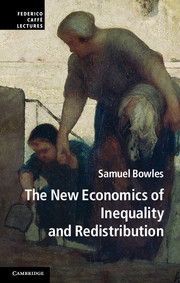Book contents
- Frontmatter
- Contents
- Illustrations
- Preface
- 1 The new economics of inequality and redistribution
- 2 The economic cost of wealth inequality
- 3 Feasible egalitarianism in a competitive world
- 4 Globalization, cultural standardization, and the politics of social insurance
- 5 Reciprocity, altruism, and the politics of redistribution
- 6 Conclusion
- Appendices
- Works cited
- Index
1 - The new economics of inequality and redistribution
Published online by Cambridge University Press: 05 February 2013
- Frontmatter
- Contents
- Illustrations
- Preface
- 1 The new economics of inequality and redistribution
- 2 The economic cost of wealth inequality
- 3 Feasible egalitarianism in a competitive world
- 4 Globalization, cultural standardization, and the politics of social insurance
- 5 Reciprocity, altruism, and the politics of redistribution
- 6 Conclusion
- Appendices
- Works cited
- Index
Summary
Socialism, radical democracy, social democracy, and other egalitarian movements have flourished where they successfully crafted the demands of distributive justice into an economic strategy capable of addressing the problem of scarcity, and thereby promised to improve living standards on the average. Redistributing land to the tiller, social insurance, egalitarian wage policies, central planning, and providing adequate health care and schooling for all have been attractive when they promised to link a more just distribution of economic reward to enhanced performance of the economic system as a whole.
For this reason economic analysis has always been central to the construction of more democratic and egalitarian alternatives to capitalism, as well as to reforms of capitalism itself. Keynesian economics, for example, supported state regulation of the macro economy and also provided a rationale for income redistribution to the less well-off who, by spending a larger portion of their incomes, could be relied upon to generate higher and more reliable levels of demand for consumer goods, and thereby to sustain greater macroeconomic stability and higher levels of employment. Similarly, the model of general competitive exchange was deployed by socialists from Oskar Lange and Enrico Barone in the 1930s to Pranab Bardhan and John Roemer two generations later to demonstrate the possibility and advantages of democratic planning.
- Type
- Chapter
- Information
- The New Economics of Inequality and Redistribution , pp. 1 - 33Publisher: Cambridge University PressPrint publication year: 2012



